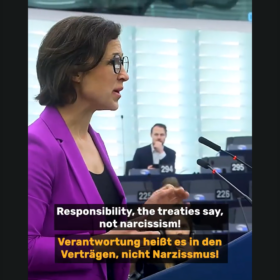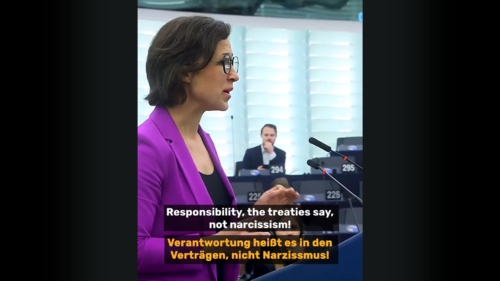Patrol ships in Morocco, shotgun ammunition in Nicaragua and Eurofighters in the Yemen war – with their research on #SpanishArms zeigen Lighthouse Reports, Lighthouse Reports show how Spanish companies circumvent EU directives and supply regimes with armaments. The reports show that a mechanism is finally needed to effectively enforce EU export criteria for arms and armaments. I was with the team in Barcelona two months ago – now the results are public.
The 2008 Common Position on arms exports should ensure that European arms are not delivered to warmongers and human rights violators. Eight very good export criteria should ensure this. So far, however, the licensing procedures for arms exports in the EU member states differ considerably. This makes it possible, for example, that despite a German arms embargo, German arms companies continue to supply arms parts to other EU member states, which can then be exported to Saudi Arabia. So despite EU directives, European arms trade remains confusing; our common export criteria are not being observed.
Maintenance of the Eurofighter during the Yemen war
Saudi Arabia has been bombing Yemen since 2015, killing more than 8,000 civilians* in the air raids. Nevertheless, Spanish companies are still maintaining Eurofighters of the Saudi Air Force. Even after researchers* reported that over a third of the air raids hit civilian buildings such as hospitals and schools, ITP Aero supplied engine parts for the Eurofighter to Saudi Arabia and requested maintenance work.
You are currently viewing a placeholder content from X. To access the actual content, click the button below. Please note that doing so will share data with third-party providers.
More InformationMaintenance of tanker aircraft during the Yemen war
In addition to Eurofighter jets, Saudi Arabia also has six Airbus A330 aircraft that have been converted into military tankers. The Spanish company Iberia was responsible for the conversion. Flight data and pictures available in Lighthouse Reports show that these tankers still commute between Spain and Saudi Arabia. Here too, it can be assumed that despite the ongoing atrocities during the Yemen war, Spanish companies are carrying out maintenance work for Saudi Arabia.
You are currently viewing a placeholder content from X. To access the actual content, click the button below. Please note that doing so will share data with third-party providers.
More InformationThe EU’s legally binding Common Position prohibits maintenance in these circumstances. Nevertheless, Spanish authorities allowed both maintenance work on the tankers and deliveries of Eurofighter engines during the bombings in Yemen. Apparently, Brussels cannot always trust national authorities as the executive authority for EU directives. We should find other ways to enforce our rules.
Patrol ships delivered without a military licence
Lighthouse Reports also found that Spanish Rodman 101 ships are used by the Navy and police in Morocco, Nicaragua, Suriname and the Philippines. However, Spain exported without a military licence. Although the ships were delivered without weapons, mounts for 12.7 mm caliber machine guns are permanently installed. According to EU criteria, the boats are therefore also considered unarmed as military goods and must be licensed accordingly.
Beyond this breach of EU law, we must now observe how European boats are used in illegally occupied areas. For example, journalists sighted the Rodman 101 in the Western Sahara. Since 1975, the Moroccan occupation there has been considered a breach of international law.
You are currently viewing a placeholder content from X. To access the actual content, click the button below. Please note that doing so will share data with third-party providers.
More InformationCentral arms export control by EU necessary
Spanish companies maintain aircraft used by Saudi Arabia to bomb civilians. Military ships are illegally sold and used in illegal occupations. Reports today show that Nicaraguan government troops fired Spanish shotgun ammunition at demonstrating students last year. – And all this without any public debate.
Unsere Exportkriterien für Rüstungsgüter sind sehr gut und wir hätten damit etliche Verletzungen von Völkerrecht oder Menschenrechten eindämmen können, wenn sich alle EU-Mitgliedstaaten an die Kriterien hielten. Es ist nun über zehn Jahre her, seit wir unsere Richtlinien für Waffenlieferungen beschlossen haben. Es ist an der Zeit, strikter durchzugreifen. Our export criteria for military equipment are very good and we could have curbed many violations of international law or human rights if all EU member states had adhered to the criteria. It is now more than ten years since we adopted our arms export guidelines. It is time for stricter enforcement. Although the common position has only recently been revised, it is far from adequate. Current revelations show that the EU cannot rely on national authorities in this regard and must monitor its own arms exports through a central control mechanism.












